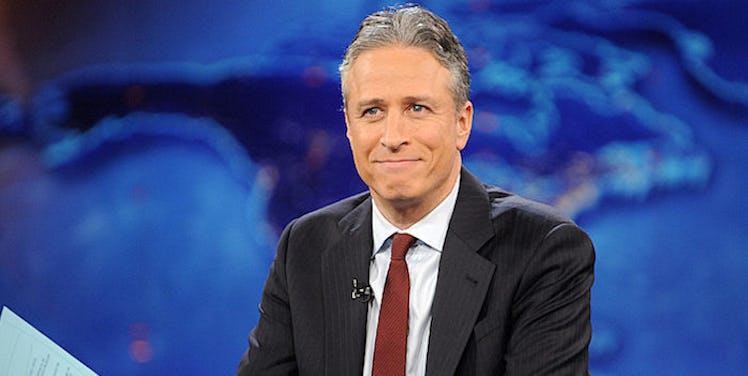
5 Things Jon Stewart Taught Me
A few weeks have passed since Jon Stewart announced his upcoming retirement as host of the popular comedic news broadcast, “The Daily Show with Jon Stewart.”
Word of Stewart’s leave came just a couple months after the final episode of Stephen Colbert’s widely popular comedy news program, “The Colbert Report,” in 2014. This has left many Millennials, myself included, wondering where we are going to turn for honest and engaging news reporting once Stewart’s retirement is finalized.
Fingers crossed Comedy Central comes up with a new figurehead who can capture our hearts and minds the way these two men have for nearly two decades.
Although my depression over the loss of these instrumental reporters has yet to lessen, here’s a look at five things Jon Stewart taught me during his reign. These lessons can guide us all through the subjective, inaccurate and ridiculous reporting done by the major news networks we know today.
1. There is still a place for satire.
Not since the days of my beloved idol, late journalist Hunter S. Thompson, has satire been so embraced by the young demographic in this country. Some argue satire is lost on the public, but Jon Stewart, Stephen Colbert and The Onion have all proved that belief wrong.
The satirical and humorous approach Stewart takes allows him and his various co-hosts to question guests, ranging from senators to the POTUS himself, on divisive and touchy subjects that are usually off-limits for most other news shows. He opens up the channel for dialogue on topics that actually matter to most Americans.
2. Politics are never black and white, unless they are; then, the government will try to make you think they're grey.
Remember, toward the end of last year, when that scathing torture report by the CIA was released to the public after a court order?
You’d think that since rectal rehydration and waterboarding are basically the textbook definition of what constitutes torture, the government as a whole would condemn these acts and clearly identify them as torture, right? Wrong.
Stewart was clearly disturbed about the extent and depth of the report when discussing it on his show. He went on to highlight an interview with the former Vice President of the United States, aka the person who was second-in-command of the free world for eight years: Dick Cheney.
Cheney vehemently denies these atrocities committed by the CIA are acts of torture. Yes, he stubbornly refuses to acknowledge that waterboarding is, indeed, torture, and our country is guilty of the same acts of torture for which we demonize other countries.
Although, thankfully, we still have some government officials who know the difference between right and wrong (shout out to Sen. McCain who deserved a standing ovation after his statement on the Senate floor condemning the entire report).
It’s clear powerful governmental groups and agencies seem to think certain political tactics like torture are one of these morally ambiguous “grey” areas.
3. Party affiliation shouldn't be the end-all, be-all of every argument. We are ONE country.
Stewart clearly favors the liberal/Democratic party on the show, yet he still emphasizes the need for compromise. He has hosted a variety of successful authors, politicians and specialists from both parties and gives respect to those who earn it, whether by fending off his wit on air or displaying their knowledge on the topic of discussion.
The US will never be a one-party governmental system, which is a good thing. However, by claiming one side and refuting everything the other side says without hearing out arguments, you are doing more damage than good.
Instead of shutting down conversations when a friend or colleague has differing political views, Stewart has shown by example how an intellectual, respectful conversation can lead to education, awareness and compromise on key issues.
4. What’s wrong with the news and how we receive it.
“The Daily Show” constantly criticizes the 24-hour news cycle that the poplar networks propagate and how this negatively affects the way we receive and interpret news. Stewart is also quick to highlight the key sponsors behind the major news networks and how these sponsors' opinions dictate what news is shown and which facts or specialists are selected.
Many Americans don’t give much thought to which network they tune in to. Through his show, Stewart has helped open the eyes of the public to the subjectivity of various news networks.
He educated citizens about the way news is packaged and prepared with a target message that is decided upon by who owns the network.
5. Young people do care about current events and how our government is run.
Millennials are often blasted for being spoiled, entitled and uninvolved when it comes to politics and the way the government is run. Stewart, with the help of Stephen Colbert, helped prove once and for all this couldn't be further from the truth.
A Pew study in 2008, found viewers of Stewart’s show were most likely to score in the highest percentile group on the knowledge of current affairs.
By making news funny, engaging and entertaining, and by embracing his young audience demographic, Stewart made loyal fans and passionate activists out of the Millennials most other news networks wrote off as unreachable and unimportant.
As much as it pains me to look to the future 2016 Presidential election and envision how it will be covered sans Stewart and Colbert, at least they have left us with a strong, factual foundation on which to make our own evaluations of the news and government officials.
Jon Stewart is going to be missed greatly by myself and many other loyal fans and concerned American citizens.